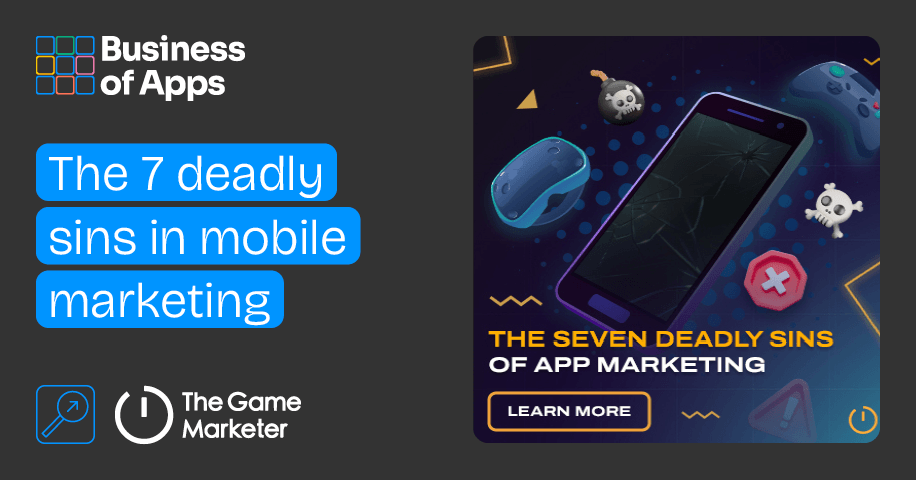Mobile marketing is a fast-moving beast that demands agility, precision, and constant attention. However, with great potential for growth, many developers and marketers find themselves falling into pitfalls that can sabotage their efforts.
To avoid these pitfalls, you need to know what they are—the 7 deadly sins of mobile marketing.
Not setting up your analytics frameworks
Now, one of the deadliest sins in mobile marketing is pride, or more specifically, the overconfidence that leads companies to overlook the importance of robust analytics. Without an analytics framework in place, you’re flying blind. Pride can trick you into believing that your instincts are enough to navigate the mobile marketing world, but in reality, data should always guide your decisions. Yes, guide instead of letting it completely direct you to certain actions.
Analytics frameworks help you identify key performance indicators (KPIs), track user behavior, and optimize campaigns. If you’re ignoring them, you might not even know when your app is underperforming. By refusing to set up comprehensive analytics from the start, you’re essentially saying, “I don’t need the data; I know what’s best.” And in today’s data-driven digital age, that’s a dangerous mindset.
Avoid Pride by making analytics a priority, ensuring you have systems to monitor installs, engagement, user retention, and even your advertising spend. It’s better to admit you need the data than suffer from ignorance.
Chasing contemporary trends in a development model
Envy lurks around when mobile marketers become obsessed with what competitors are doing, believing that copying their approach will guarantee success. This sin often manifests in blindly following trends, whether it’s a specific ad format, app feature, or marketing channel. While trends can be helpful to observe, relying solely on what’s “hot” or “trending” leads to a lack of originality and may alienate the audience you currently have.
Successful mobile marketing campaigns are about understanding your audience’s needs and desires, not chasing after what everyone else is doing. Too often, developers see the success of a competitor’s feature and decide to follow suit without evaluating whether it fits their own brand theme, messaging, or tone.
Focus on a development model that aligns with your unique product and user base. Instead of mimicking your competition, create an experience tailored to your audience’s preferences, solving their pain points in ways others cannot.
Failing to track your ROI amid mindless spending
Spending mindlessly is a hallmark of gluttony in mobile marketing. Too often, developers throw money at advertising campaigns without carefully tracking their return on investment (ROI). They buy up ad space, roll out influencer partnerships, and push promotions, all without understanding if these initiatives are actually doing something for them.
In mobile marketing, where budgets can quickly spiral out of control, this sin is costly. You may feel the urge to spend more to make an impact, but if you’re not tracking ROI, you’re wasting valuable resources.
Combat Gluttony by implementing strict financial oversight. Regularly review the performance of each campaign, and don’t be afraid to cut underperforming ads. Be disciplined in your spending, ensuring that every dollar serves a purpose and contributes to growth.
No testing plan
Sloth in mobile marketing often shows up in the absence of rigorous testing. Whether it’s A/B testing for ad creatives or beta testing for your app, many developers take a “set it and forget it” approach, hoping that their first effort is flawless. In reality, no marketing campaign should ever go live without testing.
Failing to test means you miss out on valuable data that could optimize your campaign. Even worse, skipping testing can lead to technical glitches, negative user experiences, and lost revenue. Yes, it is way easier to sit down and relax after a mountain of work, but, Sloth in this context is the refusal to put in the extra work required to ensure smooth performance before, during, and after your campaign.
No internal review process for your title
Lust in mobile marketing comes in the form of obsession with external validation without looking inward first. This is often seen in the rush to launch a title without conducting an internal review process. You may feel the temptation to impress users, partners, or investors by launching quickly. But without thorough internal evaluations, your app might be riddled with bugs, poor UX, or other issues that could have been addressed with just a little more time.
Avoid Lust by instituting an internal review process that involves your team across all departments—development, marketing, QA, and creatives. This process will catch oversights and ensure that your title is polished before it hits the market.
Bleeding audiences dry
Greed in mobile marketing happens when developers prioritize squeezing money out of their users rather than delivering value; an issue much too present nowadays. This can manifest as aggressive monetization strategies like pay-to-win mechanics, constant push notifications for in-app purchases, or overpriced microtransactions.
Such tactics might generate short-term revenue, but will eventually alienate users—especially new ones—resulting in high churn rates. When users feel like they’re being bled dry, they’ll abandon your app in favor of something more rewarding and wallet-friendly.
Avoid Greed by reaching a balance between revenue generation and user experience. Offer meaningful value through premium content or features that enhance gameplay, rather than punishing users for not spending.
Remember that a satisfied user base will lead to long-term profitability.
Turning failures inward to trash useful models
Wrath occurs when marketers react to campaign failures by scrapping everything in frustration. It’s tempting to throw out the whole model when things go wrong, but this reaction often leads to wasted efforts.
Failures are inevitable in mobile marketing, but they should be viewed as learning opportunities, not as reasons to abandon ship. Wrath-driven decisions, like dismissing entire strategies or teams after a setback, prevent you from refining your approach and achieving future success.
Resist Wrath by analyzing failures carefully. Use them to adjust your strategies and improve future campaigns rather than discarding valuable models that might just need a little tweaking. Every misstep is a chance to learn and grow.
By avoiding these seven deadly sins, you can navigate the complexities of mobile marketing with grace and success. Remember, mobile marketing isn’t just about quick wins—it’s about sustainable growth. Each sin is a potential roadblock, but with careful planning, self-awareness, and adaptability, you can overcome them and thrive in this competitive landscape.
Visit The Game Marketer for more mobile game insights.











